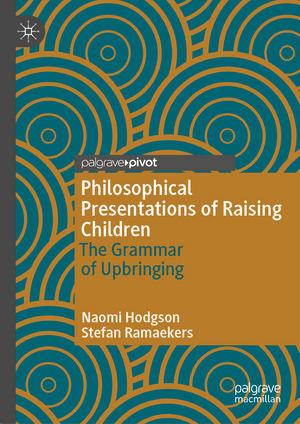Philosophical Presentations of Raising Children: The Grammar of Upbringing
Autor Naomi Hodgson, Stefan Ramaekersen Limba Engleză Hardback – 19 mar 2019
Philosophical Presentations of Raising Children will be of interest to students and scholars across a range of disciplines, including education, sociology, philosophy, critical parenting studies and film studies.
Preț: 383.50 lei
Nou
Puncte Express: 575
Preț estimativ în valută:
73.38€ • 76.82$ • 60.72£
73.38€ • 76.82$ • 60.72£
Carte tipărită la comandă
Livrare economică 07-21 aprilie
Preluare comenzi: 021 569.72.76
Specificații
ISBN-13: 9783030125394
ISBN-10: 3030125394
Pagini: 128
Ilustrații: IX, 120 p. 1 illus.
Dimensiuni: 148 x 210 x 15 mm
Greutate: 0.31 kg
Ediția:1st ed. 2019
Editura: Springer International Publishing
Colecția Palgrave Macmillan
Locul publicării:Cham, Switzerland
ISBN-10: 3030125394
Pagini: 128
Ilustrații: IX, 120 p. 1 illus.
Dimensiuni: 148 x 210 x 15 mm
Greutate: 0.31 kg
Ediția:1st ed. 2019
Editura: Springer International Publishing
Colecția Palgrave Macmillan
Locul publicării:Cham, Switzerland
Cuprins
Part I: Philosophical background.- 1. Parenting, upbringing, and educational philosophy.- 2. The educational force of film: Presentations of upbringing.- Part II: The films.- 3. The Seventh Continent: Taking care and making family.- 4. Dogtooth: Initiating children in language and world.- 5. Le Fils: (Re)Turning and assembling Reminders.- Part III: Postscript.- 6. Towards a pedagogical understanding of upbringing.
Recenzii
“This highly engaging new book from Naomi Hodgson and Stefan Ramaekers constitutes a valuable contribution to an emerging area of scholarship that invites readers to see films as texts with significant philosophical purchase on our most contested contemporary issues.” (Alexis Gibbs, Studies in Philosophy and Education, Vol. 39, 2020)
Notă biografică
Naomi Hodgson is Senior Lecturer in Education Studies, Liverpool Hope University, UK.
Stefan Ramaekers is Senior Lecturer in the Laboratory for Education and Society, KU Leuven, Belgium.
Stefan Ramaekers is Senior Lecturer in the Laboratory for Education and Society, KU Leuven, Belgium.
Textul de pe ultima copertă
This book uses contemporary film to articulate a philosophical account of raising children. It forms part of a revaluation of the parent as a pedagogical figure, which stands in contrast to the instrumental accounts dominant in contemporary ‘parenting’ culture. Hodgson and Ramaekers use film in order to offer an affirmative account of the experience of raising children, as a presentation of those inevitable aspects and experiences that upbringing is: the initiation into language and the world; the representative nature of the parent; and the maintaining of mundane practices that constitute our shared culture and community. The films which are discussed are taken as grammatical investigations and enable the authors to develop an account of the use of film in education and as educational philosophy, and to respond to each film’s invitation to articulate the existential dimensions of raising children.
Philosophical Presentations of Raising Children willbe of interest to students and scholars across a range of disciplines, including education, sociology, philosophy, critical parenting studies and film studies.
Philosophical Presentations of Raising Children willbe of interest to students and scholars across a range of disciplines, including education, sociology, philosophy, critical parenting studies and film studies.
Caracteristici
Takes a philosophical approach to the analysis of an area that is usually predominantly understood in psychological and sociological terms Uses presentations of upbringing in film Focuses on upbringing, rather than on a direct critique of the ‘parenting culture’
